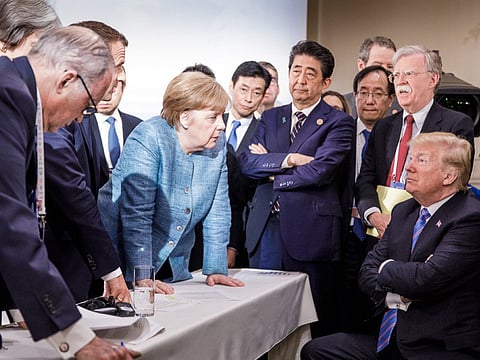US import tariffs rock ties with allies
Citing security interests, the Trump administration opted for the easiest way to impose a legal catch-all trade measure

US President Donald Trump’s move to press ahead with an import tariff plan on steel and aluminium will have repercussions. Trading partners affected by the protectionist and politically-motivated policy will not remain silent. Perhaps, Trump is stirring things up to trigger a debate to improve the economic strengths of declining industrialised nations, who tend to slide back to bilateralism due to the stagnating multilateralism.
Although a backlash against US goods is being considered, Trump could well be doing nothing wrong. The businessman-turned-politician has constructed buildings and towers around the globe for several decades. That means he knows about the manufacturing and purchase prices of construction materials in US and foreign markets.
The fast-approaching mid-term US elections could have spurred Trump into action. The US president is perceptive enough to know that it is time to deliver on one of his key election promises — Make America Great Again. Short of options, he could be ramping up the pressure to strike better trade deals through a little-known loophole. The language of the provision under mutually agreed rules is so broad, self-judging and ambiguous that it is open to interpretation and thus can easily be abused. It can, for example, be argued that garment-producing industries would qualify for the exception on the ground that an army must have summer and winter uniforms. Not willing to bank on subsidies or price dumping, Trump is nevertheless determined to revitalise US industries that lost jobs due to evolving trade patterns and global competitiveness. Trump, the US Trade Representative and their advisers opted to play with trade policies in an unorthodox way. Though it’s rare, it has been done in the past. The US had invoked national security when it adopted a politically-motivated embargo on trade with Cuba in 1962, and Nicaragua in 1982. The World Trade Organisation (WTO), which promotes free trade, sets out how countries and trading blocs should frame and implement their foreign trade policies. Cross-border trade exchanges are thus subject to binding and enforceable rules. Exceptions, however, include emergency action on imports of particular products, and security-related items.
By choosing an action considered necessary for the protection of security interests, the Trump administration opted for the easiest way for imposing a legally defensible catch-all trade policy measure. The question is whether the unilaterally imposed military hardware-related measure can be justified?
Military allies and main trading partners of the US feel offended since they are now perceived as a threat to US national security. Neighbouring Canada and the European Union (EU) are also anxious. What is overlooked is the fact that it is the US consumers who will pay for the tariff hike when they decide to purchase a listed foreign or US product made of, or containing imported steel or aluminium. If enforceable rules and proportional punishment were absent, the resulting anarchy would inevitably lead to conflict. The WTO’s dispute settlement mechanism is the platform to resolve issues if a member breaches contractual obligations. So the EU took the matter to the WTO. But that was last week.
At the Quebec G7 meeting last week, which included the EU, Trump indicated he might be ready for dialogue on trade barriers, but it would come with a price since “the United States has been taken advantage of for decades and decades”. The G7 government leaders are yet to respond. If the US and EU fail to find common ground, as WTO litigation history shows, it can take several years before the case is settled.
Johann Weick is an expert in international trade policy, European integration and specialist in GCC-EU relations.


